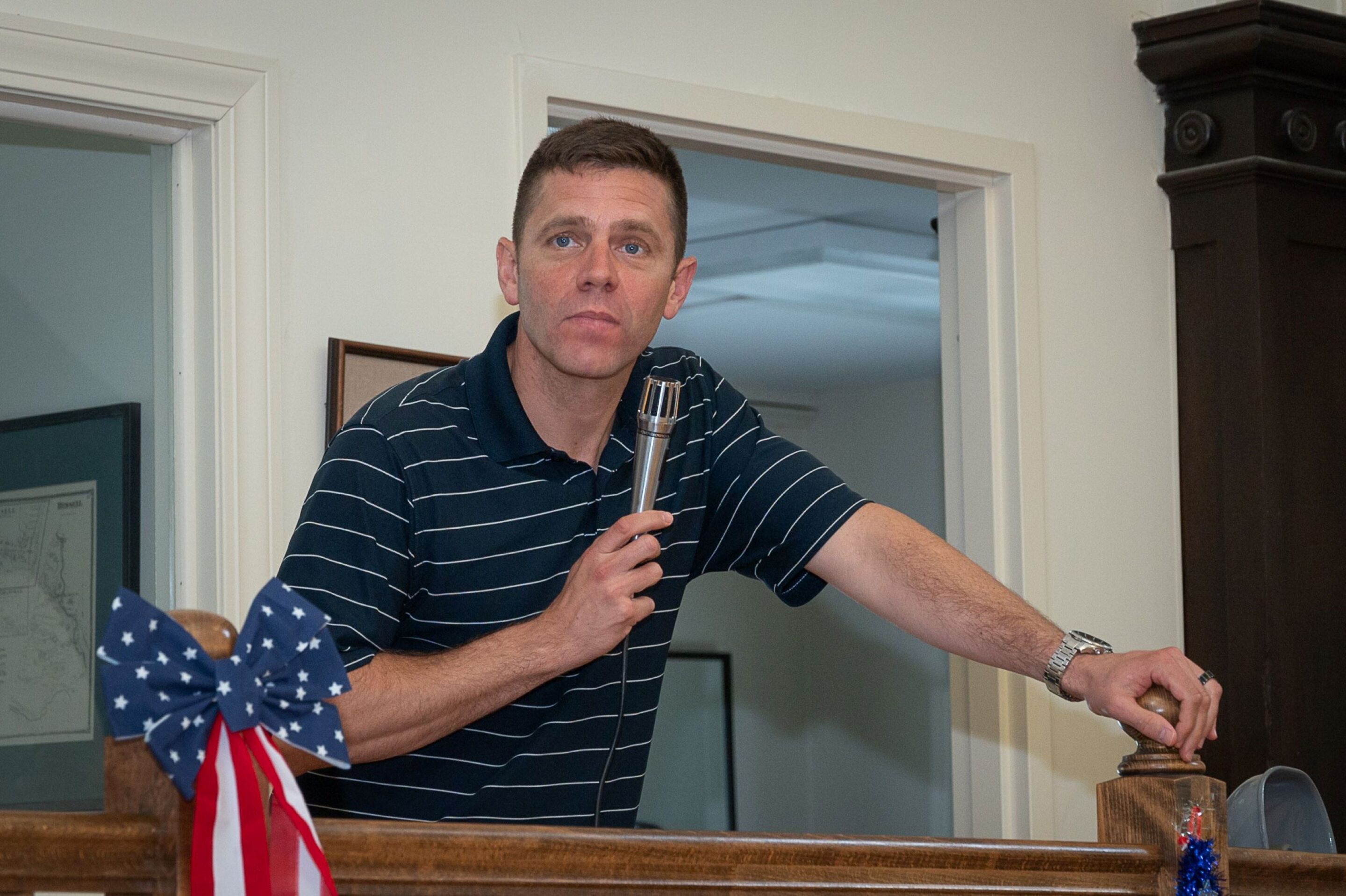State Sen. John Velis at a Russell Memorial Day ceremony in May.
Reminder Publishing photo by Marc St. Onge
State Sen. John Velis said he is done with talk about the federal government helping states like Massachusetts with the migrant crisis.
“I want action. Here we are funding virtually all of this ourselves. I’m done giving out information [that help is] right around the corner. This is truly an example that actions speak louder than words,” Velis said when talking about the billion dollars that Massachusetts spent in the past year on emergency housing assistance, and the $1 million the state received from the federal government.
“If this program continues on its current trajectory, it is going to have disastrous implications on the commonwealth,” he said.
According to a report issued on June 3 by state Sen. Michael Rodrigues and state Rep. Aaron Michlewitz, chairs of the state Senate and House Committees on Ways and Means, the anticipated cost of delivering the Emergency Housing Assistance Program in fiscal year 2025 will be $915 million.
As of the same report, there were 7,435 families in the EA program statewide. Local communities currently housing families through the EA program include Amherst, Chicopee, Holyoke, Northampton, Springfield and West Springfield, which combined were housing 687 families as of May 30.
Velis said Chicopee, Holyoke and West Springfield, which are in his district, have been doing it for a long time. He said the communities on the receiving end are those with centrally located hotels.
“One of the issues that I’ve had throughout this process, is it’s time to geographically spread this out. Other communities have been immune from the fiscal impacts of this at a local level, which is fundamentally unfair.
“I agree 100% that it’s a humanitarian catastrophe, but it’s also a fiscal catastrophe, one we are ill-equipped and unprepared to deal with,” Velis said.
When he speaks to students, Velis asks them the difference between state government and federal government. “Imagine going into a grocery store. For everything you have to buy, you use a debit card, money you have. We can’t spend what we don’t have,” he tells them, whereas the federal government can deficit spend, using a wide variety of vehicles.
“What’s happening is because of the incredibly large sums of money we’re spending on EA, which is having an impact on other programs,” Velis said. He shared that he voted against the last supplemental budget at the beginning of May to continue to fund the program with $251 million for FY24, and $175 million for FY25.
“Previous to that, there was another supplemental budget that I voted for. I made it clear as part of the discussion that we needed some sort of off ramp. Last time, there was no off ramp.
“I think the amount of money we’ve spent is well over $1 billion. All of the challenges are happening at the local level. All of the resources local communities are having to spend in an unanticipated way is just not sustainable. Education, public safety — all of these things that are really difficult to quantify.”
Velis said this is happening when municipality after municipality is facing budget shortfalls and hitting tax levees, requiring 2.5% overrides. “They don’t have the money, With all of this money going to the EA program, there is absolutely less money.”
Again, Velis blamed the federal government. “All of this points in one direction. The colossal failure of the federal government from doing anything in immigration; from giving us money, from speeding up work permits. No state is equipped … to deal with colossal immigration,” he said.
On Aug. 31, 2023, Gov. Maura Healey issued an order activating up to 250 National Guard members to provide basic services at emergency shelter hotels that did not have a contracted service provider.
“Massachusetts is in a state of emergency, and we need all hands-on deck to meet this moment and ensure families have access to safe shelter and basic services,” Healey said in an announcement prior to the deployment. Healey said while her administration worked to implement a more permanent staffing solution, the National Guard would provide an efficient and effective means of delivering these services and keeping everybody safe.
“I am the only member of the Legislature who actually got called up as a response to this, when the government called up 250 members of the National Guard,” Velis said.
He said there were about 40 hotels that the Guard had a presence in. “I probably went to 15 of them. All of the folks were migrants, all of them were from Haiti. I made a point of talking to all of the folks who were there. One of the things that I asked — what do you wish you could do that you are currently not allowed to do. Without exception, all of them raised their hands and said ‘we want to work.’ The only way out of this crisis in my opinion is to make folks self-sufficient, which happens to coincide with a group of people that absolutely want to work. We also have a workforce crisis in Massachusetts and beyond.”
Velis said there is an opportunity to do something positive in getting people to work in areas such as health care, where there are shortages, and a population who can fill them. “The federal government is not issuing workforce permits fast enough. There hasn’t been one issued since December,” he said.
Velis pointed to the 1875 Freeman Case which determined that immigration is an issue that belongs in the federal government. He said when it doesn’t act, states like Massachusetts and other states that don’t have the financial bandwidth must act, to the detriment of its residents.
Massachusetts is the only state in the union that has a Right to Shelter law. Velis said New York City has one, but New York State does not. “In the 1980s when Gov. Michael Dukakis proposed this, it coincided with deinstitutionalization. They did not anticipate and foresee the immigration crisis we have right now.”
Velis said it is a sign of a mature legislative body that when facts change, they are revisited. “We need to revisit Right to Shelter. I’m not saying repeal, I’m not saying preserve; it might be time to suspend it,” he said, adding, “Think of all the different things that government funds in Massachusetts — I’m of the opinion that all of those things are vulnerable.”
Velis said the state has taken some steps. There is now a nine-month cap on how long families can stay in the EA housing. “The challenge with that is once those families leave, other families will fill that void.”
In the last week of June, Healey also sent members of her administration to the U.S. southern border, as record numbers of immigrant families continued to arrive in Boston and the state’s family shelter system was at capacity. The goal of the trip, according to the announcement, was to make connections with the U.S. Customs and Border Protection, Joint Task Force-North, non-governmental organizations and families to educate them about the lack of shelter availability in Massachusetts.
“This trip is an important opportunity to meet with families arriving in the U.S. and the organizations that work with them at the border to make sure they have accurate information about the lack of shelter space in Massachusetts,” said Emergency Assistance Director General Scott Rice of Southampton, who led the team. “It is essential that we get the word out that our shelters are full so that families can plan accordingly to make sure they have a safe place to go.”
Another positive sign not directly related to the migrant crisis was the $5 billion housing bond bill that the Legislature was expected to vote on June 27. “Everybody talks about policies that make people leave. The 20 to 40 demographic can’t afford to live here. The good thing if you have to point to one is there is absolute consensus. I’m really excited we’re taking this up and getting it to the governor’s desk very soon. Housing is the biggest issue in Massachusetts right now,” Velis said.


